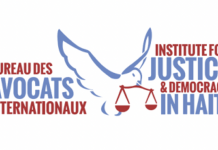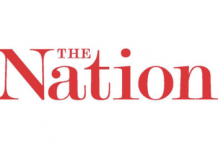by Kim Ives (Haiti Liberte)
The legal noose is tightening
around the United Nations to take responsibility for unleashing the world’s
worst cholera epidemic in the Western Hemisphere’s poorest nation, where
hundreds of thousands have been affected by the deadly disease.
around the United Nations to take responsibility for unleashing the world’s
worst cholera epidemic in the Western Hemisphere’s poorest nation, where
hundreds of thousands have been affected by the deadly disease.
On
Oct. 9, lawyers representing over 5,000 Haitian cholera victims and their
families will file a class action lawsuit in the Southern District of New York
to demand that the UN recognize its responsibility for introducing cholera into
Haiti three years ago and pay reparations.
Oct. 9, lawyers representing over 5,000 Haitian cholera victims and their
families will file a class action lawsuit in the Southern District of New York
to demand that the UN recognize its responsibility for introducing cholera into
Haiti three years ago and pay reparations.
Lawyers
with the Boston-based Institute for Justice and Democracy in Haiti (IJDH) and
the Port-au-Prince-based International Lawyers Office (BAI) first
brought a legal petition against the UN in November 2011 within the world
body’s legal redress framework. That 37-page complaint
charged that the “UN is liable for negligence, gross negligence, recklessness,
and deliberate indifference for the health and lives of Haitian people
resulting in petitioners’ injuries and deaths from cholera” and sought
financial compensation for 5,000 Haitian petitioners, constructive action to
prevent cholera’s spread, and a formal acknowledgment of and apology for the
UN’s responsibility for bringing cholera into Haiti.
with the Boston-based Institute for Justice and Democracy in Haiti (IJDH) and
the Port-au-Prince-based International Lawyers Office (BAI) first
brought a legal petition against the UN in November 2011 within the world
body’s legal redress framework. That 37-page complaint
charged that the “UN is liable for negligence, gross negligence, recklessness,
and deliberate indifference for the health and lives of Haitian people
resulting in petitioners’ injuries and deaths from cholera” and sought
financial compensation for 5,000 Haitian petitioners, constructive action to
prevent cholera’s spread, and a formal acknowledgment of and apology for the
UN’s responsibility for bringing cholera into Haiti.
It
took the UN over 15 months to reply on Feb. 21, 2013 in the form of a two-page
letter arguing that “these claims are not receivable pursuant to Section 29
of the Convention on the Privileges and Immunities of the United Nations”
governing the 9,000 UN soldiers deployed in Haiti since June 2004 as part of
the Security Council-mandated UN Mission to Stabilize Haiti (MINUSTAH).
took the UN over 15 months to reply on Feb. 21, 2013 in the form of a two-page
letter arguing that “these claims are not receivable pursuant to Section 29
of the Convention on the Privileges and Immunities of the United Nations”
governing the 9,000 UN soldiers deployed in Haiti since June 2004 as part of
the Security Council-mandated UN Mission to Stabilize Haiti (MINUSTAH).
‘‘They
may have immunity, but they don’t have impunity,’’ responded lawyer Ira Kurzban
of the civil rights law firm Kurzban, Kurzban, Weinger, Tetzelli & Pratt
(KKWT), who collaborates with the IJDH.
may have immunity, but they don’t have impunity,’’ responded lawyer Ira Kurzban
of the civil rights law firm Kurzban, Kurzban, Weinger, Tetzelli & Pratt
(KKWT), who collaborates with the IJDH.
On
May 8, IJDH lawyers held another press conference to tell the UN that, having
exhausted internal UN legal avenues, they would soon be bringing a lawsuit in
U.S. courts. That promise is to be
fulfilled at 10 a.m. on Oct. 9 when the lawyers will present their case to a
judge at the Daniel Patrick Moynihan Courthouse on 500 Pearl Street in New
York.
May 8, IJDH lawyers held another press conference to tell the UN that, having
exhausted internal UN legal avenues, they would soon be bringing a lawsuit in
U.S. courts. That promise is to be
fulfilled at 10 a.m. on Oct. 9 when the lawyers will present their case to a
judge at the Daniel Patrick Moynihan Courthouse on 500 Pearl Street in New
York.
Over
seven medical research teams, including one sponsored by the UN itself, have
investigated the cholera epidemic and concluded that it was unleashed when
cholera-infected UN Nepalese soldiers stationed in the town of Mirebalais on
Haiti’s Central Plateau allowed their sewage to leak into the headwaters of the
Artibonite River, Haiti’s largest. Cholera, a water-borne bacteria, is
primarily transmitted when human feces infects drinking water.
seven medical research teams, including one sponsored by the UN itself, have
investigated the cholera epidemic and concluded that it was unleashed when
cholera-infected UN Nepalese soldiers stationed in the town of Mirebalais on
Haiti’s Central Plateau allowed their sewage to leak into the headwaters of the
Artibonite River, Haiti’s largest. Cholera, a water-borne bacteria, is
primarily transmitted when human feces infects drinking water.
The
legal action comes at a time when high-ranking UN officials are urging
Secretary General to “come clean.” On Oct. 8, UN High Commissioner for Human
Rights Navi Pillay said that “Haiti’s cholera victims should get compensation
but she didn’t say by whom,” according to the Associated Press. “The remarks
are the first time a UN official has spoken publicly about a need to provide
compensation for Haiti’s cholera victims.”
legal action comes at a time when high-ranking UN officials are urging
Secretary General to “come clean.” On Oct. 8, UN High Commissioner for Human
Rights Navi Pillay said that “Haiti’s cholera victims should get compensation
but she didn’t say by whom,” according to the Associated Press. “The remarks
are the first time a UN official has spoken publicly about a need to provide
compensation for Haiti’s cholera victims.”
Pillay’s
remarks were made in Geneva, Switzerland at the Oct. 8 ceremony for the Martin
Ennals Award for Human Rights Defenders. The BAI’s lead lawyer, Mario Joseph,
was one of the three finalists for the prize.
remarks were made in Geneva, Switzerland at the Oct. 8 ceremony for the Martin
Ennals Award for Human Rights Defenders. The BAI’s lead lawyer, Mario Joseph,
was one of the three finalists for the prize.
On
Aug. 7, Jean-Marie Guéhenno, the former chief of UN Peacekeeping Operations
from 2000 to 2008, tweeted that: “Peacekeepers have done a lot for Haiti, but
UN needs to come clean on cholera crisis. Strong report from Yale Law School.”
Aug. 7, Jean-Marie Guéhenno, the former chief of UN Peacekeeping Operations
from 2000 to 2008, tweeted that: “Peacekeepers have done a lot for Haiti, but
UN needs to come clean on cholera crisis. Strong report from Yale Law School.”
He
was referring to a 58-page report
entitled “Peacekeeping without
Accountability: The United Nations’ Responsibility for the Haitian Cholera
Epidemic,” which concludes that: “1)The cholera epidemic in Haiti is
directly traceable to MINUSTAH peacekeepers and the inadequate waste
infrastructure at their base in Méyè. 2) The UN’s refusal to establish a claims
commission for the victims of the epidemic violates its contractual obligation
to Haiti under international law. 3) By introducing cholera into Haiti and
denying any form of remedy to victims of the epidemic, the UN has failed to
uphold its duties under international human rights law. 4) The UN’s
introduction of cholera into Haiti and refusal to accept responsibility for
doing so has violated principles of international humanitarian aid.”
was referring to a 58-page report
entitled “Peacekeeping without
Accountability: The United Nations’ Responsibility for the Haitian Cholera
Epidemic,” which concludes that: “1)The cholera epidemic in Haiti is
directly traceable to MINUSTAH peacekeepers and the inadequate waste
infrastructure at their base in Méyè. 2) The UN’s refusal to establish a claims
commission for the victims of the epidemic violates its contractual obligation
to Haiti under international law. 3) By introducing cholera into Haiti and
denying any form of remedy to victims of the epidemic, the UN has failed to
uphold its duties under international human rights law. 4) The UN’s
introduction of cholera into Haiti and refusal to accept responsibility for
doing so has violated principles of international humanitarian aid.”
In
May 2012, even UN Special Envoy to Haiti Bill Clinton admitted
that a UN Nepalese soldier had brought cholera to Haiti, depositing “his waste
stream into the waterways of Haiti and into the bodies of Haitians.”
May 2012, even UN Special Envoy to Haiti Bill Clinton admitted
that a UN Nepalese soldier had brought cholera to Haiti, depositing “his waste
stream into the waterways of Haiti and into the bodies of Haitians.”
For
the lawsuit to be filed Oct. 9, “there are five named plaintiffs in the
complaint, but we are filing a class action which means that they will act as
representatives for all others similarly situated, that is, all others who
either contracted cholera themselves or had a family member die from the
disease,” explained Kermshlise Picard, IJDH’s Communications Coordinator.
the lawsuit to be filed Oct. 9, “there are five named plaintiffs in the
complaint, but we are filing a class action which means that they will act as
representatives for all others similarly situated, that is, all others who
either contracted cholera themselves or had a family member die from the
disease,” explained Kermshlise Picard, IJDH’s Communications Coordinator.
Having
the judge accept the case as a class action is important, said another IJDH
lawyer Brian Concannon, because “any of the almost 700,000 victims can opt in.”
the judge accept the case as a class action is important, said another IJDH
lawyer Brian Concannon, because “any of the almost 700,000 victims can opt in.”
In
May, IJDH lawyers had said they might seek $100,000 for the family of each
cholera victim who died and $50,000 for each victim who lived through the
ordeal. But in this week’s filing, “we
are not making any specific demand at this point,” Concannon said.
May, IJDH lawyers had said they might seek $100,000 for the family of each
cholera victim who died and $50,000 for each victim who lived through the
ordeal. But in this week’s filing, “we
are not making any specific demand at this point,” Concannon said.
“This
is an historic opportunity for the U.S. courts to hold the United Nations
strictly to its treaty obligations, by refusing to allow the UN to hide behind
immunity when it refuses to provide its victims any alternative,”
Concannon concluded.
is an historic opportunity for the U.S. courts to hold the United Nations
strictly to its treaty obligations, by refusing to allow the UN to hide behind
immunity when it refuses to provide its victims any alternative,”
Concannon concluded.
Protestors across Haiti have long condemned the UN for
bringing cholera to Haiti. Now a lawsuit aims to make them pay for it.
bringing cholera to Haiti. Now a lawsuit aims to make them pay for it.





